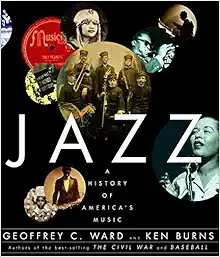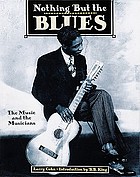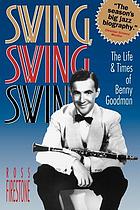 Go to A-Z Databases: Books & eBooks to search for more eBooks. Must be on campus or login with your COM account for off campus access.
Go to A-Z Databases: Books & eBooks to search for more eBooks. Must be on campus or login with your COM account for off campus access.
Want more on finding books or eBooks? Try our How to Use Books & eBooks guides.
 Blues Boy: The Life and Music of B.B. King
B B. King has never let up in his fight to become the living personification of the best of the blues for the whole world. He was indeed the first to introduce blues to Japanese, Russian, and Chinese audiences. Although he was born in the days of swing and big bands, his music has blossomed and prospered even as rhythm & blues, rock'n'roll, soul, funk, and rap have taken a turn at becoming the height of music fashion. "I don't think there is a better blues guitarist in the world than B. B. King." This statement by Eric Clapton could have been made also by Buddy Guy, the Rolling Stones, or Ireland's U2. All of them, and many others, have said recurrently that the man they nickname "King of the Blues" was their true mentor. By exploring all aspects of King's life and career, this book like none other before provides an objective description of the man and his music. A revision of the edition published in France in 1993 by `editions du Limon, it supplements B. B. King's moving autobiography Blues All Around Me. Whereas King's is a book of memories, this is an objective story with careful historical perspective and observations from key witnesses. It draws on many printed sources, from King's published interviews, and from the author's recurring encounters with King and his manager since 1977. It shows how in some ways B. B. King's life has conformed to the commonly adopted image of the blues singer's early years of poverty and hardship in the American South, a backdrop of cottonfields and muddy waters of the Mississippi River, a musical apprenticeship in the big city (Memphis), and a career that reaches its peak under the spotlights of Las Vegas. B. B. King's success is shown here as the result of his uncommon doggedness, of his constant attention to fashion and to African-American culture, and of his respect for his audiences and his roots. By exploring all aspects of blues music's leading figure, this book conveys a portrait of a creative genius who also is just a man.
Blues Boy: The Life and Music of B.B. King
B B. King has never let up in his fight to become the living personification of the best of the blues for the whole world. He was indeed the first to introduce blues to Japanese, Russian, and Chinese audiences. Although he was born in the days of swing and big bands, his music has blossomed and prospered even as rhythm & blues, rock'n'roll, soul, funk, and rap have taken a turn at becoming the height of music fashion. "I don't think there is a better blues guitarist in the world than B. B. King." This statement by Eric Clapton could have been made also by Buddy Guy, the Rolling Stones, or Ireland's U2. All of them, and many others, have said recurrently that the man they nickname "King of the Blues" was their true mentor. By exploring all aspects of King's life and career, this book like none other before provides an objective description of the man and his music. A revision of the edition published in France in 1993 by `editions du Limon, it supplements B. B. King's moving autobiography Blues All Around Me. Whereas King's is a book of memories, this is an objective story with careful historical perspective and observations from key witnesses. It draws on many printed sources, from King's published interviews, and from the author's recurring encounters with King and his manager since 1977. It shows how in some ways B. B. King's life has conformed to the commonly adopted image of the blues singer's early years of poverty and hardship in the American South, a backdrop of cottonfields and muddy waters of the Mississippi River, a musical apprenticeship in the big city (Memphis), and a career that reaches its peak under the spotlights of Las Vegas. B. B. King's success is shown here as the result of his uncommon doggedness, of his constant attention to fashion and to African-American culture, and of his respect for his audiences and his roots. By exploring all aspects of blues music's leading figure, this book conveys a portrait of a creative genius who also is just a man.
![]()
Go to OneSearch to search for more print books.
Want more on finding print books? Try our How to Use OneSearch guide.
 Jazz: A History of America's Music
The companion volume to the ten-part PBS TV series by the team responsible for The Civil War and Baseball. Continuing in the tradition of their critically acclaimed works, Geoffrey C. Ward and Ken Burns vividly bring to life the story of the quintessential American music--jazz. Born in the black community of turn-of-the-century New Orleans but played from the beginning by musicians of every color, jazz celebrates all Americans at their best. Here are the stories of the extraordinary men and women who made the music: Louis Armstrong, the fatherless waif whose unrivaled genius helped turn jazz into a soloist's art and influenced every singer, every instrumentalist who came after him; Duke Ellington, the pampered son of middle-class parents who turned a whole orchestra into his personal instrument, wrote nearly two thousand pieces for it, and captured more of American life than any other composer. Bix Beiderbecke, the doomed cornet prodigy who showed white musicians that they too could make an important contribution to the music; Benny Goodman, the immigrants' son who learned the clarinet to help feed his family, but who grew up to teach a whole country how to dance; Billie Holiday, whose distinctive style routinely transformed mediocre music into great art; Charlie Parker, who helped lead a musical revolution, only to destroy himself at thirty-four; and Miles Davis, whose search for fresh ways to sound made him the most influential jazz musician of his generation, and then led him to abandon jazz altogether. Buddy Bolden, Jelly Roll Morton, Dizzy Gillespie, Art Tatum, Count Basie, Dave Brubeck, Artie Shaw, and Ella Fitzgerald are all here; so are Sidney Bechet, Coleman Hawkins, Lester Young, John Coltrane, Ornette Coleman, and a host of others. But Jazz is more than mere biography. The history of the music echoes the history of twentieth-century America. Jazz provided the background for the giddy era that F. Scott Fitzgerald called the Jazz Age. The irresistible pulse of big-band swing lifted the spirits and boosted American morale during the Great Depression and World War II. The virtuosic, demanding style called bebop mirrored the stepped-up pace and dislocation that came with peace. During the Cold War era, jazz served as a propaganda weapon--and forged links with the burgeoning counterculture. The story of jazz encompasses the story of American courtship and show business; the epic growth of great cities--New Orleans and Chicago, Kansas City and New York--and the struggle for civil rights and simple justice that continues into the new millennium. Visually stunning, with more than five hundred photographs, some never before published, this book, like the music it chronicles, is an exploration--and a celebration--of the American experiment.
Jazz: A History of America's Music
The companion volume to the ten-part PBS TV series by the team responsible for The Civil War and Baseball. Continuing in the tradition of their critically acclaimed works, Geoffrey C. Ward and Ken Burns vividly bring to life the story of the quintessential American music--jazz. Born in the black community of turn-of-the-century New Orleans but played from the beginning by musicians of every color, jazz celebrates all Americans at their best. Here are the stories of the extraordinary men and women who made the music: Louis Armstrong, the fatherless waif whose unrivaled genius helped turn jazz into a soloist's art and influenced every singer, every instrumentalist who came after him; Duke Ellington, the pampered son of middle-class parents who turned a whole orchestra into his personal instrument, wrote nearly two thousand pieces for it, and captured more of American life than any other composer. Bix Beiderbecke, the doomed cornet prodigy who showed white musicians that they too could make an important contribution to the music; Benny Goodman, the immigrants' son who learned the clarinet to help feed his family, but who grew up to teach a whole country how to dance; Billie Holiday, whose distinctive style routinely transformed mediocre music into great art; Charlie Parker, who helped lead a musical revolution, only to destroy himself at thirty-four; and Miles Davis, whose search for fresh ways to sound made him the most influential jazz musician of his generation, and then led him to abandon jazz altogether. Buddy Bolden, Jelly Roll Morton, Dizzy Gillespie, Art Tatum, Count Basie, Dave Brubeck, Artie Shaw, and Ella Fitzgerald are all here; so are Sidney Bechet, Coleman Hawkins, Lester Young, John Coltrane, Ornette Coleman, and a host of others. But Jazz is more than mere biography. The history of the music echoes the history of twentieth-century America. Jazz provided the background for the giddy era that F. Scott Fitzgerald called the Jazz Age. The irresistible pulse of big-band swing lifted the spirits and boosted American morale during the Great Depression and World War II. The virtuosic, demanding style called bebop mirrored the stepped-up pace and dislocation that came with peace. During the Cold War era, jazz served as a propaganda weapon--and forged links with the burgeoning counterculture. The story of jazz encompasses the story of American courtship and show business; the epic growth of great cities--New Orleans and Chicago, Kansas City and New York--and the struggle for civil rights and simple justice that continues into the new millennium. Visually stunning, with more than five hundred photographs, some never before published, this book, like the music it chronicles, is an exploration--and a celebration--of the American experiment.
 Nothing But the Blues : The Music and the Musicians
Like Abbeville's Country: The Music and the Musicians, Nothing but the Blues is an illustrated, comprehensive history of music and musicians, also covering promoters, producers and others who have shaped this powerful and enduringly popular American musical art form. A guide to the best discography is included at the back of the book which will appeal to blues fans and record collectors.
Nothing But the Blues : The Music and the Musicians
Like Abbeville's Country: The Music and the Musicians, Nothing but the Blues is an illustrated, comprehensive history of music and musicians, also covering promoters, producers and others who have shaped this powerful and enduringly popular American musical art form. A guide to the best discography is included at the back of the book which will appeal to blues fans and record collectors.
 Swing, Swing, Swing : The Life & Times of Benny Goodman
Swing music has for so long been synonymous with the standards and mainstream that we've forgotten how innovative and controversial the form was. The hot world of Swing, spearheaded in the 1930's by the Benny Goodman Orchestra, elicited a social uproar that can be compared only to that of the Beatles. Now Firestone offers a new biography of the brilliant, difficult Benny Goodman.
Swing, Swing, Swing : The Life & Times of Benny Goodman
Swing music has for so long been synonymous with the standards and mainstream that we've forgotten how innovative and controversial the form was. The hot world of Swing, spearheaded in the 1930's by the Benny Goodman Orchestra, elicited a social uproar that can be compared only to that of the Beatles. Now Firestone offers a new biography of the brilliant, difficult Benny Goodman.
© 2024 COM Library
1200 Amburn Road, Texas City, Texas 77591
409-933-8448 . FAX 409-933-8030
This work is licensed under a Creative Commons Attribution-NonCommercial 4.0 International License